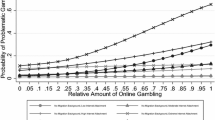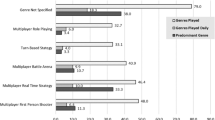Abstract
The exponential increase in Internet use has been associated with dangers and harms. Recently, the prevalence of online gambling is increasing in various countries. Online gambling can be a prelude to gambling disorder. No study has been conducted in this field in Iran yet. The aim of this study was to investigate the prevalence of online gambling (without disorder and pathological), and its relationship with demographic variables and psychiatric symptoms. 3252 people participated in this study online. Research tools included gambling disorder screening questionnaire-Persian (GDSQ-P), brief symptom inventory (BSI), Young's addiction questionnaire, and Demographic questionnaire. The prevalence of online gambling was 8.9%. 26.6% of online gamblers experience moderate to severe degrees of pathological gambling. 74.7% of online gamblers were male. Online gamblers have a lower mean age than non-online gamblers (p < 0.001). Online gamblers were equally from all economic classes. The most common methods of gambling were CRASH game and sports betting. Online gamblers had no significant difference in the rate of face-to-face (physical) gambling history, compared to non-online gamblers (6.9% vs 5.6%), (p > 0.05). In BSI-assessed psychiatric symptoms, online gamblers showed higher scores on anxiety and obsession, and lower scores on paranoid ideation, compared to the control group (p < 0.05). Also, Internet addiction and daily use of the Internet as entertainment were significantly higher in online gamblers than non-online gamblers (p < 0.05). Also, a positive and significant correlation was found between the severity of gambling and the severity of Internet addiction, severity of depression, severity of anxiety, and severity of obsession in online gamblers (p < 0.05). Overall, online gambling is common in Iran and is associated with psychiatric problems. Health professionals and the government should pay special attention to online gambling and its related problems.


Similar content being viewed by others
References
Aricak, O. T. (2019). Problematic online betting among turkish adolescents. J Gambl Stud, 35(1), 31–45.
American Psychiatric Association. (2013). Diagnostic and statistical manual of mental disorders (DSM-5®). American Psychiatric Pub.
Barrault, S., Untas, A., & Varescon, I. (2014). Special features of poker. International Gambling Studies, 14(3), 492–504.
Blaszczynski, A. (1999). Pathological gambling and obsessive-compulsive spectrum disorders. Psychological Reports, 84(1), 107–13.
Chou, C., Condron, L., & Belland, J. C. (2005). A review of the research on Internet addiction. Educational Psychology Review, 17(4), 363–88.
Desai, R. A., & Potenza, M. N. (2008). Gender differences in the associations between past-year gambling problems and psychiatric disorders. Social Psychiatry and Psychiatric Epidemiology, 43(3), 173–83.
Díaz, A., & Pérez, L. (2020). Online gambling-related harm: Findings from the study on the prevalence, behavior and characteristics of gamblers in Spain. Journal of Gambling Studies. https://doi.org/10.1007/s10899-020-09966-x
Doosti Irani, A., Bagheri Amiri, F., Khajehkazemi, R., & Mostafavi, E. (2017). Prevalence of internet addiction among students and graduates of epidemiology, clinical sciences, and basic sciences in Iran: A cross-sectional study. Iranian Journal of Epidemiology, 13(1), 14–21.
Effertz, T., Bischof, A., Rumpf, H.-J., Meyer, C., & John, U. (2018). The effect of online gambling on gambling problems and resulting economic health costs in Germany. The European Journal of Health Economics, 19(7), 967–78.
Estevez, A., Herrero-Fernández, D., Sarabia, I., & Jauregui, P. (2015). The impulsivity and sensation-seeking mediators of the psychological consequences of pathological gambling in adolescence. Journal of Gambling Studies, 31(1), 91–103.
Fidler, J. A., Shahab, L., & West, R. (2011). Strength of urges to smoke as a measure of severity of cigarette dependence: comparison with the Fagerström Test for Nicotine Dependence and its components. Addiction, 106(3), 631–8.
Frost, R. O., Meagher, B. M., & Riskind, J. H. (2001). Obsessive-compulsive features in pathological lottery and scratch-ticket gamblers. Journal of Gambling Studies, 17(1), 5–19.
González-Cabrera, J., Machimbarrena, J. M., Beranuy, M., Pérez-Rodríguez, P., Fernández-González, L., & Calvete, E. (2020). Design and measurement properties of the Online Gambling Disorder Questionnaire (OGD-Q) in Spanish adolescents. J Clin Med., 9(1), 120.
Grall-Bronnec, M., Caillon, J., Humeau, E., Perrot, B., Remaud, M., Guilleux, A., Rocher, B., Sauvaget, A., & Bouju, G. (2016). Gambling among European professional athletes. Prevalence and associated factors. Journal of Addictive Diseases, 35(4), 278–290.
Grassi, G., Makris, N., & Pallanti, S. (2020). Addicted to compulsion: assessing three core dimensions of addiction across obsessive-compulsive disorder and gambling disorder. CNS Spectrums, 25(3), 392–401.
Håkansson, A. (2020). Impact of COVID-19 on online gambling–a general population survey during the pandemic. Frontiers in Psychology, 11, 2588.
Håkansson, A., & Widinghoff, C. (2020). Over-indebtedness and problem gambling in a general population sample of online gamblers. Frontiers in Psychiatry, 11, 7.
Kairouz, S., Paradis, C., & Nadeau, L. (2012). Are online gamblers more at risk than offline gamblers? Cyberpsychology, Behavior, and Social Networking, 15(3), 175–80.
Kheradmand, A., Amirlatifi, E. S., Sohrabi, M. R., & Mazaheri Meybodi, A. (2019). Validation of the Persian smartphone addiction scale among Tehran university students, Iran. International Journal of High Risk Behaviors and Addiction. https://doi.org/10.5812/ijhrba.81176
LaBrie, R. A., LaPlante, D. A., Nelson, S. E., Schumann, A., & Shaffer, H. J. (2007). Assessing the playing field: A prospective longitudinal study of internet sports gambling behavior. Journal of Gambling Studies, 23(3), 347–62.
Maarefvand, M., Mardaneh-Jobehdar, M., Ghiabi, M., Rafimanesh, H., Mohammadi, A., Morshedi, Z., et al. (2019). Designing and evaluating the validity and reliability of the Persian gambling disorder screening questionnaire. Addict Health, 11(2), 110–9.
McCormack, A., & Griffiths, M. D. (2013). A scoping study of the structural and situational characteristics of internet gambling. International Journal of Cyber Behavior, Psychology and Learning (IJCBPL), 3(1), 29–49.
McCormack, A., Shorter, G. W., & Griffiths, M. D. (2013). An examination of participation in online gambling activities and the relationship with problem gambling. Journal of Behavioral Addictions, 2(1), 31–41.
McCormack, A., Shorter, G. W., & Griffiths, M. D. (2014). An empirical study of gender differences in online gambling. Journal of Gambling Studies, 30(1), 71–88.
Medeiros, G. C., & Grant, J. E. (2018). Gambling disorder and obsessive-compulsive personality disorder: A frequent but understudied comorbidity. Journal of Behavioral Addictions, 7(2), 366–74.
Meyer, G., Fiebig, M., Häfeli, J., & Mörsen, C. (2011). Development of an assessment tool to evaluate the risk potential of different gambling types. International Gambling Studies, 11(2), 221–36.
Modara, F., Rezaee-Nour, J., Sayehmiri, N., Maleki, F., Aghakhani, N., Sayehmiri, K., et al. (2017). Prevalence of internet addiction in Iran: a systematic review and meta-analysis. Addiction and Health, 9(4), 243.
Mohammadkhani, P., Dobson, K. S., Amiri, M., & Ghafari, F. H. (2010). Psychometric properties of the Brief Symptom Inventory in a sample of recovered Iranian depressed patients. International Journal of Clinical and Health Psychology, 10(3), 541–51.
Monaghan, S. (2009). Internet gambling–not just a fad. Taylor & Francis. https://doi.org/10.1080/14459790902793077
Olason, D. T., Hayer, T., Brosowski, T., & Meyer, G. (2015). Gambling in the mist of economic crisis: results from three national prevalence studies from Iceland. J Gambl Stud., 31(3), 759–74.
Pezoa-Jares, R., Espinoza-Luna, I., & Vasquez-Medina, J. (2012). Internet addiction: A review. Journal of Addiction Research and Therapy. https://doi.org/10.4172/2155-6105.S6-004
Reise, S. P., & Waller, N. G. (2009). Item response theory and clinical measurement. Annual Review of Clinical Psychology, 5, 27–48.
Tavares, H., & Gentil, V. (2007). Pathological gambling and obsessive-compulsive disorder: Towards a spectrum of disorders of volition. Brazilian Journal of Psychiatry, 29(2), 107–17.
Welte, J., Barnes, G., Wieczorek, W., Tidwell, M.-C., & Parker, J. (2001). Alcohol and gambling pathology among US adults: Prevalence, demographic patterns and comorbidity. Journal of Studies on Alcohol, 62(5), 706–12.
Author information
Authors and Affiliations
Corresponding author
Ethics declarations
Ethical Approval
All procedures used in collecting survey data on which this article relies on, are in accordance with the ethical standards of the Helsinki Declaration of 1964 and subsequent amendments or ethical standards. All data were collected anonymously, and no association could be established between the questionnaires and the responders.
Additional information
Publisher's Note
Springer Nature remains neutral with regard to jurisdictional claims in published maps and institutional affiliations.
Rights and permissions
About this article
Cite this article
Davoudi, M., Shirvani, S., Foroughi, A. et al. Online Gambling in Iranian Social Media Users: Prevalence, Related Variables and Psychiatric Correlations. J Gambl Stud 38, 397–409 (2022). https://doi.org/10.1007/s10899-021-10020-7
Accepted:
Published:
Issue Date:
DOI: https://doi.org/10.1007/s10899-021-10020-7




